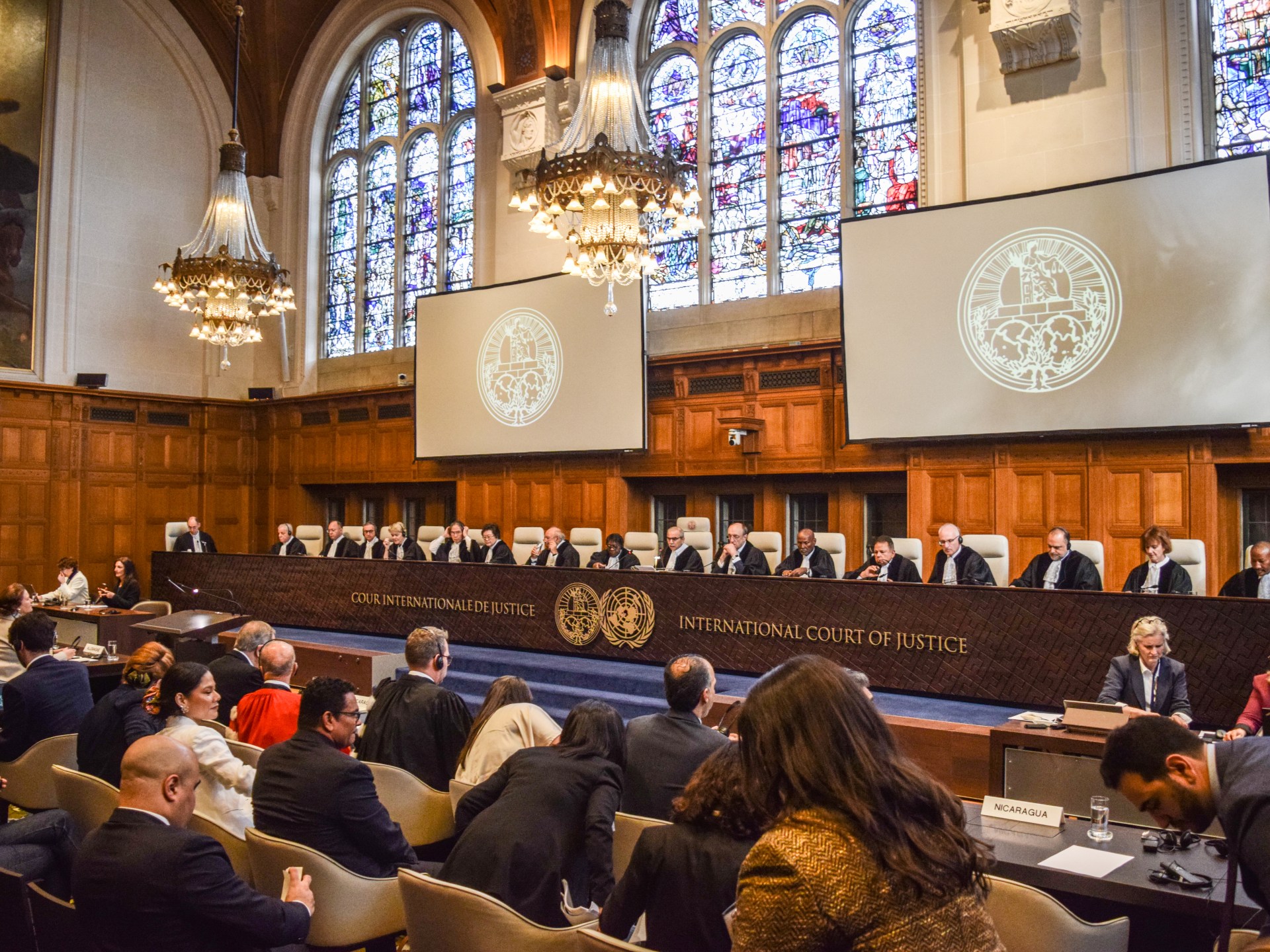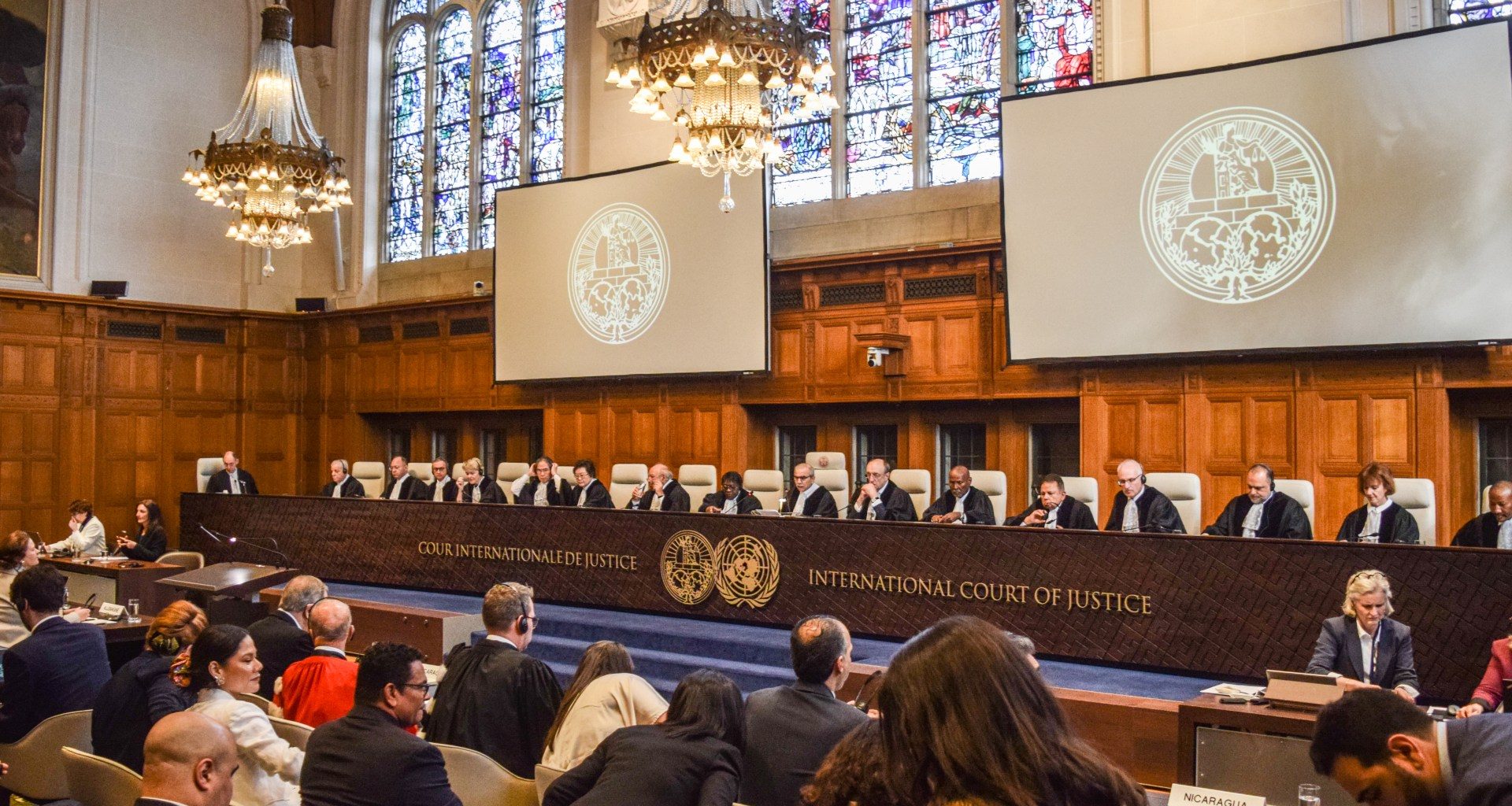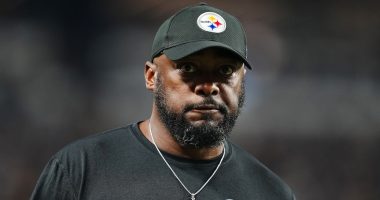
In a fast-expanding global battleground, enablers and opponents of Israel’s genocidal assault on Gaza are facing off in an unusual landscape: courtrooms. Over the past six months, lawyers, activists, organisations and states who believe that international law and conventions that prohibit genocide actually mean something and must be implemented have submitted an unprecedented number of lawsuits and motions to national and international courts.
This new frontier in the century-old battle between Palestinian Arabism and Zionism is significant because it promises a more level playing field where traditional military-political strengths and weaknesses are neutralised or even reversed.
This extraordinary legal mobilisation is already worrying the Israeli government, which is seeking help from Western allies to fend off the accusations. Meanwhile, the Israeli army has established an international law department to handle the flood of new legal challenges to Israel’s conduct in the Gaza Strip.
And yet, mainstream Western media is mostly staying away from covering this important story in depth.
Perhaps it is because the United States and many other Western governments are charged as complicit main backers of the crime of genocide in these cases. Or perhaps it is because an ally of the West is accused of such heinous crimes.
Whatever the reason, the lack of diligent coverage says much about where the Western media’s heart is. It is consistent with the longstanding convergence between the Israeli position, US government policy and mainstream media coverage – or lack of it.
One of the pivotal developments in the legal fight to stop Israeli genocide is the ongoing South African case against Israel at the International Court of Justice (ICJ). During the initial January hearing in The Hague, most Western outlets did not cover South Africa’s arguments in the case in full, likely because they revealed many uncomfortable truths about Israel’s ongoing assault on Gaza and the 75 years of Israeli ethnic cleansing of Palestinians.
On January 26, the ICJ found it is “plausible” Israel committed acts in Gaza that violate the Convention on the Prevention and Punishment of the Crime of Genocide. Israel and its Western allies ignored it while much of the Western media downplayed it or emphasised the positive spin for Israel – that the ICJ did not order a halt to Israeli attacks.
For the rest of the world, though, the ruling was an important victory. It provided new momentum in the struggle to stop governments and corporations from assisting Israel’s assault on Gaza. Its findings encouraged many around the world who have launched their own legal challenges to Israel’s savage war on Gaza.
In February, Nicaragua urged the governments of the United Kingdom, Germany, the Netherlands and Canada to immediately halt the supply of arms, ammunition, technology and/or components to Israel. It gave them written notice that it would adopt all appropriate legal measures, including recourse at the ICJ, “to guarantee respect for these fundamental international texts and customary international law”.
In early April, Nicaragua did take Germany to the ICJ, accusing it of “facilitating the commission of genocide” in Gaza. It formally requested the court to order the German government to stop supplying weapons to Israel.
Various parties have also approached the International Criminal Court (ICC), which has the mandate to try individuals and entities accused of atrocities.
In early March, Australian lawyers referred Australian Prime Minister Anthony Albanese to the ICC for possible complicity in genocide. The submission points to Australian government actions, such as the freezing of $6m in United Nations aid funding for the Palestinians, the export of arms to Israel and the provision of military aid and other actions as grounds for the referral.
A few weeks later, Law for Palestine, supported by the Independent Commission for Human Rights – Palestine and 15 Arab and international groups sent a communication to the ICC demanding the court investigate accusations of Israeli war crimes and genocide.
In most cases, only local news outlets covered these novel developments, which collectively represent a dramatic new phase in what has become a global battle between pro-Israel states and anti-colonial and anti-apartheid activists in the Global South.
In parallel, legal challenges in national courts across the Western world highlight the growing links between human rights advocates in the West and the Palestinians.
In November, the respected Center for Constitutional Rights (CCR) filed a lawsuit in a California court on behalf of Palestinian families in Gaza and the United States, accusing President Joe Biden, Secretary of State Antony Blinken and Secretary of Defense Lloyd Austin of failure to prevent and complicity in the Israeli genocide against the Palestinians in Gaza. They sought a court decision to order the US government to end military and diplomatic support to Israel while the genocide continues.
The court found that Israeli actions “plausibly constitute genocide” and implored Biden to examine the unwavering US support for it but decided it was unable to rule on the matter because foreign policy is an executive branch prerogative.
In March, CCR filed an appeal supported by more than 100 attorneys, experts and human rights organisations, arguing that stopping genocide is legally mandatory, not optional, in US and international law. The appeals court is set to hold an initial hearing in June.
CCR Senior Staff Attorney Diala Shamas, who works on the organisation’s anti-genocide cases and was in The Hague for the ICJ sessions, told me in an interview last week that different parties are exploring using a variety of legal avenues to halt the genocide as quickly as possible.
“The law’s promise is precisely to stop this kind of criminal action. What’s significant about the genocide issue is how states are required to act on the fundamental international norm,” she said.
Belief in this promise and this legal requirement to act has driven other actors to file legal challenges aimed at halting Western support for the Israeli genocide.
In December, the Palestinian human rights organisation Al-Haq and the UK-based Global Legal Action Network asked the UK’s High Court to prohibit the granting of licenses for weapons exports to Israel because it commits atrocities in Gaza. The court dismissed the case, but Al-Haq vowed to seek another court hearing on the issue.
In February, in a similar case brought by Oxfam Novib, Pax Nederland and The Rights Forum, a Dutch court of appeals ordered the government to stop the delivery to Israel of spare parts for the F-35 fighter jet, citing a clear risk of violations of international law.
In early April, Berlin-based lawyers filed an urgent application on behalf of Palestinian families in Gaza to stop the German government from approving contracts for weapons sales to Israel, which they believe uses them in violation of laws against genocide and war crimes, including the terms of the German Arms Control Act.
Meanwhile, Palestine Speaks and Jewish Voice for Just Peace in the Middle East filed a lawsuit against former German parliamentarian Volker Beck, the head of the German-Israeli Society, for suspected incitement of hate and denial of war crimes in Israel’s war on Gaza.
What this moment reveals, Shamas told me, is how national and international legal systems operate in parallel, not in a hierarchy. The genocide charge is so significant that it opens up new legal and other avenues of action to stop it, such as public demonstrations, petitions, lobbying in Washington, and activism. “The intersection of politics, law, and activism is on full display,” she said.
Also important to note is that there is no statute of limitation for the crime of genocide. So as facts are unearthed and verified in Gaza or in foreign capitals that support the charge of genocide against Israel, legal cases can be initiated around the world at any time.
“We may be only seeing the beginning of litigation against governments, individuals or corporations. Weapons manufacturers, energy companies and others could be charged, and many individuals associated with the genocide accusations should be worried,” Shamas said.
Legal cases are one of the most powerful means of bringing facts to the attention of the world, exposing criminal behaviour and seeking redress for gross injustices. This arena should be a natural ally to the media, which ideally should disseminate facts and credible analysis.
As the legal challenges to Israel’s genocide keep growing around the world and implicate Western governments, officials and companies as accomplices, it is no surprise that the mainstream Western media continues to ignore or downplay them. But a time will come when Western complicity in the Israeli genocide of the Palestinians will become impossible to cover up. Media organisations would do well now to at least report honestly on the surge of global litigation against Israel’s genocide. Otherwise, they run the risk of being swept up in the tide of the many political and corporate accomplices now being named in courts around the world.
The views expressed in this article are the author’s own and do not necessarily reflect Al Jazeera’s editorial stance.
Read More: World News | Entertainment News | Celeb News
Aljazera







